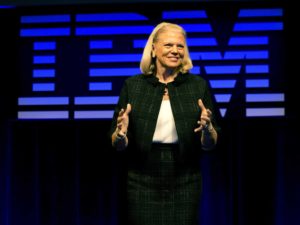When Virginia “Ginni” Rometty became the CEO of global information technology giant IBM in early 2012, she inherited her predecessor’s goal to double the company’s earnings within five years. As IBM continued to struggle to revamp its business, Rometty scrapped the old plan and went full force with her vision to transform IBM into an all-cloud “solutions provider.”
The female CEO in a male dominated industry grew up in a “very middle class average background” in Chicago. As the oldest of four siblings, at age 15 when her parents got divorced, she was forced to look after her siblings while her mother worked various jobs and attended night classes. Her mother served as a major role model for Ginni, who learned early on that “there’s no problem that can’t be solved.”
After graduating from Northwestern, funded by a scholarship from General Motors, Rometty worked for the auto company for two years before launching her stellar career at IBM.
As a 36-year-old vet of the IT behemoth, Ginni climbed her way to the top of the company through proving herself in executive level positions such as the lead of IBM’s business services segment, where she was credited with championing the firm’s acquisition and integration of PwC Consulting. After making her mark, she was promoted to the head of IBM’s sales and marketing division.
Now, the 60-year-old has been tasked with transforming IBM into a durable leader in the evolving 21st century tech landscape. If changing the wheels while driving wasn’t hard enough, Ginni has had to do so all in the face of the unapologetic public eye.
Her strategy has involved shedding some of the firm’s more unprofitable business arms, while doubling down on next-gen technologies in growth markets such as the cloud, blockchain, the Internet of Things (IoT), artificial intelligence and cybersecurity.
In 2016, IBM posted a profit of $13 billion on sales of nearly $80 billion, yet investors have become restless with 21 consecutive quarters of decline. In response to the criticism, Rometty, America’s eight-highest-paid CEO, has attributed IBM’s declines to spin offs and currency pressures, along with short-term shocks due to higher spending on building out new businesses.
When legendary investor Warren Buffet sold off nearly one-third of his IBM holdings in May, citing heightened competition, Ginni responded that IBM’s capability to change is “in its DNA.” She prefers the term “transformation” as opposed to “turnaround,” frequently noting IBM’s over century-old legacy in the ever-disrupting tech space.
IBM’s CEO is upbeat on the firm’s investment in artificial intelligence, driven by its AI platform Watson. In November 2013, the AI learnings system moved entirely to the cloud. The firm estimates Watson will touch one billion people, or about 13% of the world’s population by the end of 2017. Last tax season, Watson was employed by H&R Block to assist thousands of its workers in handling millions of returns. In 2014, the New York Genome Center began leveraging Watson for brain cancer treatment. Two years later, IBM acquired the Weather Company to build out the Watson IoT cloud platform.
Ginni is also serious about unlocking the power of data for enterprise clients so that they can access it and make use of it with better decision making. She suggests IBM is aggressively going after this $2 trillion market for better decision making. In July 2014, IBM inked a deal with the city of Beijing to help mitigate its mounting pollution issue, teaming up with Apple in order to create business software for decision making.
As for the cloud, Ginni has hammered in three differentiators she believes make the offering superior to its rivals. First, the CEO suggests that the platform is “enterprise strong,” with over 400 projects on Blockchain and applications across industries such as healthcare, food and beverage and finance. Second, IBM’s cloud is data first, suggests Ginni, touting the platform’s data diversity and data control. Lastly, the CEO boasts Watson’s range of cognitive capabilities on the cloud.
As IBM experiences the growing pains of transformation, Ginni has remained firmly at the helm with passion and perseverance.
“The only way you survive is you continuously transform into something else. It’s this idea of continuous transformation that makes you an innovation company,” says Rometty.
























